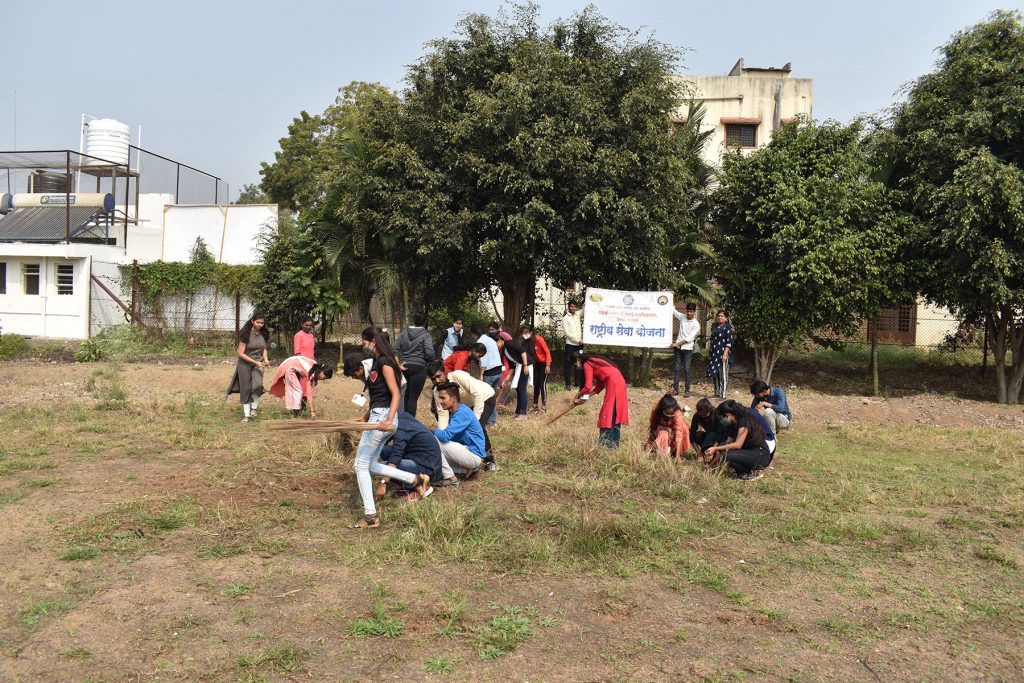Title of the Practice: Promotion of environmental consciousness among students and faculty
1. Objectives of the Practice:
The institute aims to promote environmental consciousness among students, leading to more environmentally friendly decisions and lifestyles. The goals of the practice include protecting and sensitizing students to the environment, extending the life of electronic components, promoting energy conservation, and promoting carbon neutrality in college premises.
CONTEXT –
Maharashtra has experienced frequent droughts and heatwaves, and urbanization has led to challenges such as water scarcity and soil degradation. The region around Uruli Kanchan is undergoing rapid transition, causing problems like water scarcity and soil degradation. To address these threats, there is a need for cleaner, more accessible, and efficient models based on renewable energy sources.
The Practice:
The institute’s plan of action is to adopt specific measures to achieve fairer, greener, and more respectful college premises. Solutions include motivating students to participate in the cause, efficient usage of rainwater harvested, converting waste into resources, motivating farmers to cultivate organic agriproducts, and dedicating manpower to ensure cleanliness on the campus.
In conclusion, the institute’s practices aim to create an environment-friendly society and promote environmental consciousness among students, addressing the challenges posed by climate change, water scarcity, and waste management.
The Environmental Consciousness at P.M.D. College Campus is a unique initiative that promotes sustainable and eco-friendly practices in the campus. Initiatives include planting trees, using vermicomposting units, implementing a rooftop rainwater harvesting project, promoting plastic-free campus, planting a botanical garden, landscaping, managing e-waste, using hazardous chemical disposal, developing a pedestrian walking track, restricting automobile use, using renewable energy, conducting green audits by external peers, labeling plants on the campus, developing vermicomposting units, displaying signs/posters to encourage environmental awareness, organizing seminars/workshops, installing LED bulbs in buildings, and observing ‘No Vehicle Day’.
The college has successfully implemented these practices through various activities such as tree plantations, vermicomposting units, and promoting environmental awareness through seminars and workshops. The college has also implemented a plastic-free campus through signboards and display boards, recycled effluents from the Chemistry laboratory, and converted solid waste into organic fertilizers through vermicomposting units. Career-oriented courses have been introduced to further enhance environmental consciousness.
The college has also implemented a green audit program to promote environmental management and conservation, with the goal of educating students about environmental concerns and sustainability. The college has also implemented a solar lighting system and organized seminars on environmental issues.
Evidence of the Success:
This best practice has proven to be successful through the following activities: • Through periodical tree plantations, Flora on the campus has been enriched, which has turned into eco-friendly campus. • There have been substantial saving in electrical power consumption. • Awareness campaign for the plastic-free campus through signboards/display boards made campus plastic free. • Through the Effluent Treatment Plant (ETP) effluents from Chemistry laboratory is recycled and treated water is utilized for different purposes. This has led to water conservation and minimization of environmental pollution on the campus. • Vermicomposting units helped us to convert solid waste into organic fertilizers, which has minimized the solid waste on the campus.
In conclusion, the Environmental Consciousness at P.M.D. College Campus has proven successful in promoting sustainable practices and reducing environmental impact.
